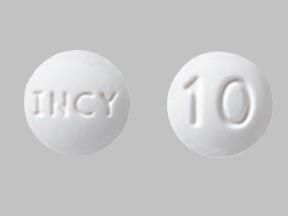Jakafi and Alcohol/Food Interactions
There are 2 alcohol/food/lifestyle interactions with Jakafi (ruxolitinib).
Ruxolitinib Food
Moderate Food Interaction
GENERALLY AVOID: Grapefruit juice may increase the plasma concentrations of ruxolitinib. The proposed mechanism is inhibition of CYP450 3A4-mediated first-pass metabolism in the gut wall by certain compounds present in grapefruits.
MANAGEMENT: Patients treated with ruxolitinib should avoid consumption of grapefruit, grapefruit juice, and any supplement containing grapefruit extract. Ruxolitinib may be administered with or without food.
References (1)
- (2011) "Product Information. Jakafi (ruxolitinib)." Incyte Corporation
Switch to consumer interaction data
Ruxolitinib High Cholesterol (Hyperlipoproteinemia, Hypertriglyceridemia, Sitosterolemia)
Moderate Potential Hazard, Moderate plausibility
ruxolitinib - lipid elevations
The use of ruxolitinib may increase total cholesterol, low-density lipoprotein (LDL) cholesterol, and triglycerides. It is recommended to assess lipid parameters approximately 8-12 weeks following initiation of therapy and to monitor and treat per clinical guidelines for the management of hyperlipidemia. Care should be exercised when using this agent in patients with lipids disorders.
References (1)
- (2011) "Product Information. Jakafi (ruxolitinib)." Incyte Corporation
Switch to consumer interaction data
Jakafi drug interactions
There are 508 drug interactions with Jakafi (ruxolitinib).
Jakafi disease interactions
There are 12 disease interactions with Jakafi (ruxolitinib) which include:
- cardiovascular risk
- malignancy
- thrombosis
- lung toxicity
- cytopenia
- hepatic impairment
- Hepatitis B
- infections
- lipid elevations
- PML
- renal impairment
- tuberculosis
More about Jakafi (ruxolitinib)
- Jakafi consumer information
- Check interactions
- Compare alternatives
- Pricing & coupons
- Reviews (33)
- Drug images
- Side effects
- Dosage information
- During pregnancy
- FDA approval history
- Drug class: multikinase inhibitors
- Breastfeeding
- En español
Related treatment guides
Drug Interaction Classification
| Highly clinically significant. Avoid combinations; the risk of the interaction outweighs the benefit. | |
| Moderately clinically significant. Usually avoid combinations; use it only under special circumstances. | |
| Minimally clinically significant. Minimize risk; assess risk and consider an alternative drug, take steps to circumvent the interaction risk and/or institute a monitoring plan. | |
| No interaction information available. |
Further information
Always consult your healthcare provider to ensure the information displayed on this page applies to your personal circumstances.


